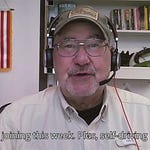In the morning’s oppressive heat and humidity, the Huey’s rotors spun up, savagely churning the stillness of the jungle with their obscene drumming. The machine lifted off from the clearing, dipped the nose and moved out quickly, bearing the mangled body of a brother Marine, headed for a field hospital.
The Lieutenant scanned the somber faces of the remaining members of the young squad. He settled on 20-year-old Salt and jerked his head toward the trail. “Salt,” he said, “take the point.”
Salt looked from the officer to the trail, back to the officer, then back to the trail where it bent through thick jungle canopy, a blank, uncomprehending look on his face.
That moment was the beginning of the end of Salt’s war.
Sitting on his helmet
Ten years after the event, I had coffee with Salt, a fellow sales rep at a major corporation. Dressed in business suits — normal business attire, they called it — we took our morning break at the coffee shop next door to our office building. With only minimal prompting I heard his story.
“When the LT told me to take the point,” he said, “it was like I didn’t understand what he was saying.” Salt cooled his coffee as he slurped gently. “The last two guys who led the squad that morning had been blown up, one about an hour before, and then this one. You couldn’t see the improvised mines in the trail. They were so well hidden under leaves and brush that they were invisible. Both guys had stepped right on them.”
Salt paused, staring at the coffee, seeing things I could only guess at. “If you’re lucky, all they will do is blow your foot off.”
“So… did you take the point?” I asked. Salt was only a few years older than I. I had followed the Vietnam war as a high schooler, interested, like every boy, in the excitement of combat. But I had not served, missing the conflict by a couple of years.
Salt did not deal with the question directly, but the answer became obvious. “The next thing I knew,” he said, “I was sitting on my helmet in the trail, crying like a baby.” He swirled his coffee and looked away. “And the thing was, I didn’t even know why.” He shrugged. “I was just crying. Wasn’t hurt; didn’t feel sick. I was just crying.”
After a pause, I asked, “So what happened next?”
He looked at me as though the question were irrelevant. “Oh, they had to call another air evac for me,” he said dismissively. He shook his head. “That was the last time I ever went on patrol. My tour was short anyway, so they put me to work in the captain’s office for my last few weeks.”
A war story all its own
In the 1970s, at the time I heard Salt’s story, Post Traumatic Stress Disorder was not a household term. Nevertheless, Salt was a victim.
About 5% of Americans suffer from PTSD. It is only slightly higher for veterans. After World War I we called it “shell shock;” after World War II it was “combat fatigue” (or, if you were General Patton, it was simple cowardice); after Vietnam it became Post Traumatic Stress Disorder, PTSD.
By the time Americans got into the conflicts in the Middle East, the rate of occurrence among military service members had tripled: 15% of veterans were diagnosed with PTSD after operations Iraqi Freedom (2011) and Enduring Freedom (2014).
I had heard my dad talk about men who had been in World War II, men who could not hold their post-war lives together. Dad would scowl and shake his head, saying only, “There’s something wrong with him. It’s not his fault, but he can’t hold a job.”
PTSD is brought about by being subjected to or witnessing a natural disaster, serious accident, combat, sexual assault or other significant violence. But it can also be triggered by slow and steady exposure to stressful circumstances.
Symptoms can manifest in different ways — nightmares, sudden anger, avoidance, self-destruction and others — but in Salt’s case there seemed to be a slow descent into apathy.
Salt confided in me: “My boss tells me, ‘Salt you’ve gotta have that report on my desk by 5 O’clock today, or else!’, and I want to ask him, ‘Or else what? What exactly are you gonna do to me? Gonna frag me? Gonna cut off my hair and send me to Vietnam? Whaddaya have in mind?’”
Unrecoverable damage
Eventually, Salt was transferred from his enviable — and high-stress — sales position to a staff job. It was a lateral move for him, which signaled that it was not a happy occasion. Staff jobs in that era and in that company were generally offered as short term promotions to rising managers.
Salt lasted in the new position maybe a year, and then he was gone. I never heard the circumstances of his departure. He either quit or was fired. He and I had never been close, and I lost track of him.
Our conversation over coffee that day comes back to me often. It is a stark reminder of human frailty. Wounds are not always on the outside.
Lots of people suffer from lots of things: rape, abortion, death of a child, loss of a career, failed marriage, dysfunctional family, financial disaster. Apparently, life offers no immunity. We are all at risk.
When it comes, perhaps the best we can hope for is to pack up the trouble, shoulder the burden, and let it guide us into productive paths. Some, incredibly, have managed to turn the wounds to something positive, where they can offer encouragement to others.
Turn it around
This may be one application that the New Testament writer James intended when he wrote, “Consider it pure joy whenever you face trials of many kinds.” He urges his readers to “let the testing of your faith produce perseverance.”
According to scholars, this James was a half-brother to Jesus, so he had seen how badly things could go.
The wounded warrior is a concept that frequently dominates my thoughts, especially as I reflect on my own cancer diagnosis. The one who is wounded is the one best able to understand the damage someone else has suffered — and then be able to help with the restoration.
I would never presume to offer shallow remedies to deep wounds, but here are a few thoughts:
Self assessment: How have you been wounded?
Others-minded: Who do you know who has been similarly afflicted?
Selfless service: If you were in their position, what help would you need?
Action plan: How can you offer encouragement, without either pity or judgment?
Recovering from a loss demands honestly acknowledging the wound, and then moving the focus from self to others. Brooding about the problem leads to more brooding about the problem.
That way lies a bitter spirit and an ineffective life.
I have come to the conclusion that we don’t have enough time on this earth to flounder in ineffectiveness. Lace up your combat boots and move out. Find the place where your unique capabilities — and wounds — make you suited to offer help.
Thanks for following The Alligator Blog. Share this with someone who could use the encouragement, or maybe with someone who just likes war stories.
To move to the next level in considering how to use your talents effectively, subscribe to our sister newsletter Your Best Retirement. It’s free, and offers weekly insights on living purposefully in the fourth quarter of your life.
Click the link below to sign up.
















Share this post